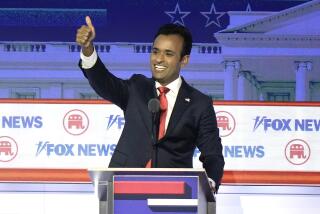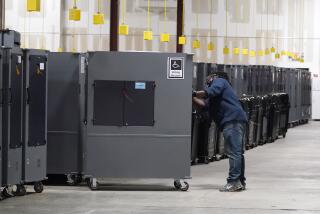Flaws Cited in Powell’s U.N. Speech on Iraq
- Share via
WASHINGTON — Days before Secretary of State Colin L. Powell was to present the case for war with Iraq to the United Nations, State Department analysts found dozens of factual problems in drafts of his speech, according to new documents contained in the Senate report on intelligence failures released last week.
Two memos included with the Senate report listed objections that State Department experts lodged as they reviewed successive drafts of the Powell speech. Although many of the claims considered inflated or unsupported were removed through painstaking debate by Powell and intelligence officials, the speech he ultimately presented contained material that was in dispute among State Department experts.
Powell’s Feb. 5, 2003, speech to the U.N. Security Council was crafted by the CIA at the behest of the White House. Intended to be the Bush administration’s most compelling case by one of its most credible spokesmen that a confrontation with Saddam Hussein was necessary, the speech has become a central moment in the lead-up to war.
The speech also has become a point of reference in the failure of U.S. intelligence. Although Powell has said he struggled to ensure that all of his arguments were sound and backed by intelligence from several sources, it nonetheless became a key example of how the administration advanced false claims to justify war.
Powell has expressed disappointment that, after working to remove dubious claims, the intelligence backing the remaining points of his U.N. speech has turned out to be flawed.
“It turned out that the sourcing was inaccurate and wrong, and in some cases deliberately misleading, and for that I am disappointed and I regret it,” Powell said in May. A State Department spokesman said late Wednesday, however, that the United States made the right decision “to go into Iraq, and the world today is safer because we did.”
Offering the first detailed look at claims that were stripped from the case for war advanced by Powell, a Jan. 31, 2003, memo cataloged 38 claims to which State Department analysts objected. In response, 28 were either removed from the draft or altered, according to the Senate report, which was released Friday and included scathing criticism of the CIA and other U.S. intelligence services.
The analysts, describing many of the claims as “weak” and assigning grades to arguments on a 5-star scale, warned Powell against making an array of allegations they deemed implausible. They also warned against including Iraqi communications intercepts they deemed ambiguous and against speculating that terrorists might “come through Baghdad and pick-up biological weapons” as if they were stocked on store shelves.
The documents underscore the extent to which administration and intelligence officials were culling a vast collection of thinly sourced claims as they sought to assemble the case for war. But the origin and full scope of some errors remain unclear because Senate investigators were denied access to a number of relevant documents, according to aides involved in the probe.
The CIA rejected requests for initial versions of what became the Powell presentation on the grounds that they were internal working documents and not finished products. And the Republican-controlled committee did not seek access to a 40-plus-page document that was prepared by Vice President Dick Cheney’s office and submitted to State Department speechwriters detailing the case the administration wanted Powell to make.
According to the Senate report, the idea for the speech originated in December 2002, when the National Security Council instructed the CIA to prepare a public response to Iraq’s widely criticized 12,000-page declaration claiming that it had no banned weapons. It wasn’t until late January 2003 that intelligence officials learned their work would form the basis for a speech Powell would give to the United Nations.
Powell and several of his aides then spent several days at CIA headquarters working on drafts of the speech, in what participants have described as sessions marked by heated arguments over what to include.
When Powell appeared before the U.N., he made a series of sweeping assertions that have crumbled under postwar scrutiny -- including claims that Iraq had chemical weapons stockpiles, was pursuing nuclear weapons and that “there can be no doubt that Saddam Hussein has biological weapons and the capability to rapidly produce more, many more.”
But the documents in the Senate report show that earlier drafts of the speech contained dozens of additional, disputed claims; they provide the most detailed glimpse to date into the last-minute scramble to strike those claims from the text.
Several of the dubious statements in the early drafts had to do with alleged Iraqi efforts to thwart weapons inspections that had been restarted by the U.N.
One allegation was that Iraq was trying to keep incriminating weapons files from falling into the hands of inspectors by having operatives carry the sensitive documents around in cars. The State Department reviewers called the claim “highly questionable” and warned that it would invite scorn from critics and U.N. inspection officials.
Another claim was that Iraq was having members of its intelligence services pose as weapons scientists to dupe U.N. inspectors. But the State Department noted that such a ruse was “not credible” because of the level of sophistication it would require.
“Interviews typically involve such topics as nuclear physics, microbiology, rocket science and the like,” the State Department reviewers wrote, indicating that even a well-rehearsed intelligence operative would be hard-pressed to pull off such a charade.
In their critique, State Department analysts repeatedly warned that Powell was being put in the position of drawing the most sinister conclusions from satellite images, communications intercepts and human intelligence reports that had alternative, less-incriminating explanations.
In one section that remained in the speech, Powell showed aerial images of a supposed decontamination vehicle circling a suspected chemical weapons site.
“We caution,” State Department analysts wrote, “that Iraq has given ... what may be a plausible account for this activity -- that this was an exercise involving the movement of conventional explosives.”
The presence of a water truck “is common in such an event,” they concluded.
The experts labeled as “weak” a claim that a photograph of an Iraqi with “marks on his arm” was evidence that Baghdad was conducting biological experiments on humans. The language was struck from the speech, although Powell told the Security Council that Iraq had been conducting such experiments since the 1980s.
State Department analysts also made it clear that they disagreed with CIA and other analysts on the allegation that aluminum tubes imported by Iraq were for use in a nuclear weapons program. “We will work with our [intelligence community] colleagues to fix some of the more egregious errors in the tubes discussion,” the memo said.
In the speech, Powell acknowledged disagreement among analysts on the tubes, but included the claim. The Senate report concluded last week that the tubes were for conventional rockets.
In a section on nuclear weapons, the analysts argued against using a communications intercept they described as “taken out of context” and “highly misleading.” There is no more information on what was in the intercept, but Powell in his speech referred to intercepted communications that he said showed that “Iraq front companies sought to buy machines that can be used to balance gas centrifuge rotors.”
Aside from the two memos, the Senate report refers to other language that was deleted from drafts of Powell’s speech, although it is not clear who urged the items to be struck.
In one case, Powell was to say that the aluminum tubes were so unsuitable for use in conventional rockets that if he were to roll one on a table, “the mere pressure of my hand would deform it.” Department of Energy engineers said that statement was incorrect.
For all their skepticism, State Department analysts did not challenge some of the fundamental allegations in the Powell speech that have since been proved unfounded. Chief among them is the claim that Iraq had mobile biological weapons laboratories, an accusation based largely on information from an Iraqi defector code-named “Curveball.”
What the State Department didn’t know at the time was that a CIA representative who had met with Curveball found him to have a drinking problem and to be highly unreliable. The CIA representative’s red flags were not relayed to Powell until recently, a State Department official said, when then-CIA Director George J. Tenet contacted Powell to tell him that problems with Curveball would be detailed in the Senate report.
More to Read
Sign up for Essential California
The most important California stories and recommendations in your inbox every morning.
You may occasionally receive promotional content from the Los Angeles Times.










